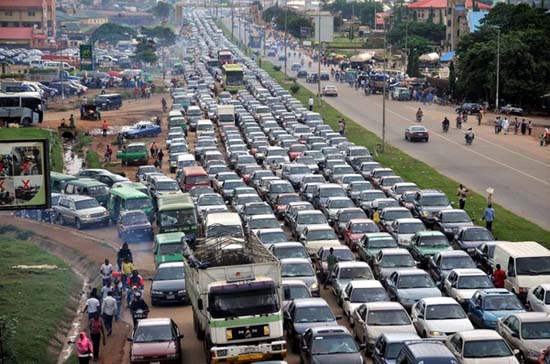A don, Prof. Funso Falade, on Thursday called for establishment of an integrated modal transportation system, to tackle gridlock in Lagos.
He made the call at the 2019 Annual Public Lecture/Induction and Awards organised by the Lagos Branch of the Nigerian Society of Engineers (NSE), in Akoka, Lagos.
Falade, Dean, Faculty of Engineering, University of Lagos, who was guest speaker at the event, said that facilities for mass transit in Lagos were insufficient.
He said they could not achieve the purpose of providing fast, comfortable and convinent travel.
Falade said as a result, commuters preferred private transportation to mass transit and this had led to huge increase in personal vehicle ownership.
“The resultant effects are too many vehicles on the road, leading to road congestion.
“There is need for an Integrated Modal Transportation System in Lagos, which will involve well coordinated combination of different modes of transportation like walking, cycling, car, rail transit and bus transit system among others.
‘The aim is to reduce dependence on automobile as a major mode of transportation.
“This will invariably reduce congestion on the road and bring about comfort to the commuters.
“The system allows commuters to easily transfer from one mode of transportation to another,” Falade said.
Mr Anthony Onyokoko, Director, Civil Department, Nigerian Railway Corporation (NRC), giving a brief history of rail services in Nigeria said government was already implementing a 25 year vision for improved rail network.
Onyokoko also stressed the need to make other ports viable to decongest Apapa.
Read Also: Extreme poverty: Politicians must think beyond next election – Emir Sanusi
He said the rail was the cheapest and most effective means of moving a huge population of people and cargo, stressing the need for government to stick to its plans to revolutionize the sector.
He also said that by the time other ports were developed, many people would not need to come to Lagos.
The Federal Controller of Works in Lagos, Mr Adedamola Kuti, who received an award of excellence, spoke on the Federal Government’s road maintenance efforts across the state.
He also said that the truck park in Apapa, which was almost completed, was to be delivered to the Nigerian Ports Authority for use by the end of April, to ease gridlock.
Kuti said that the Ministry of Power, Works and Housing had a maintenance master plan for all the bridges in Lagos and had completed repairs on seven of them.
“As we speak there is maintenance work ongoing on Alaka Bridge, Third Mainland Bridge and Independence Bridge. It is a regular thing and we would not allow a breakdown in Lagos,” he said.
Mr Abiodun Dabiri, Managing Director, Lagos Metropolitan Area Transportation Authority (LAMATA), said the state government was planning toward harmonisation of the transportation system in Lagos state.
Dabiri said the state’s bus reformation programme and establishment of bus terminals across the state were part of the processes to achieve the objective.
Mr Olalekan Agoro, Chairman of NSE, Lagos Branch, reiterated commitment of the Engineers to assist government to develop sustainable transportation system in Lagos State.
Other speakers stressed the need to link road, rail, water and air transportation.
The theme of the Lecture was: Integrated Modal Transportation System- Panacea to Incessant Traffic Congestion in Lagos.
Forty-four new members were inducted as members of the NSE Lagos branch at the programme.



Leave a Reply